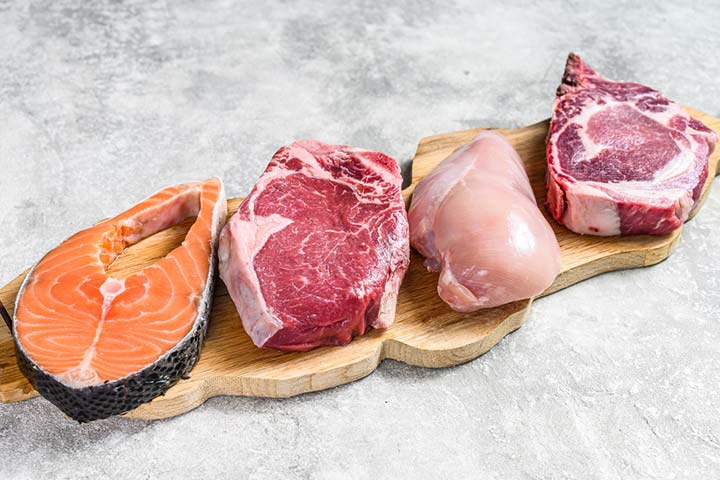
Image: Shutterstock
Winter makes babies more susceptible to diseases, so it’s important to make sure they get the right nutrients to stay healthy. Winter can also lead to increased appetite in babies. There are several healthy and tasty foods and recipes that are perfect for the winter months. In this article, we bring you foods and recipes that will keep your baby warm, comfortable, and healthy during the chilly months.
Dates
Dates are high in polyphenols, potassium, and fiber. Besides providing essential nutrients, they are also a healthy alternative to satisfy your sweet cravings (1).
You could start giving dates to babies as soon as they begin solid foods. It’s best to provide them in mashed and pureed form. Introduce dates in small quantities by giving one date per day. Gradually, you can increase the amount to two per day.
How to make dates puree
Ingredients:
- Dates (seedless) – 1 cup
- Water – as needed
Instructions:
- Chop the dates and add them to a pan. Pour enough water to submerge the dates.
- Bring the pan to a boil and turn off the flame.
- Allow the dates to become soft by letting them soak in the pan for about 20 minutes.
- Next, strain the water and mash them with a spoon.
- Use a blender to form a fine paste.
- You could either serve it directly and cook the paste again until it thickens.
- Once it reaches a thick consistency, let it cool and store in an airtight container.
- They are good to go for another 3 weeks.
Eggs
This inexpensive food offers several health benefits and is loaded with vitamins and minerals. Earlier, doctors used to recommend giving eggs to babies only after their first birthdays due to allergy concerns. However, a 2010 study showed that the early introduction of eggs might lower the chances of allergic reactions in babies (2). You can start introducing eggs between the ages of 4 to 6 months old, provided you talk to your baby’s doctor beforehand. If your child starts showing any allergic reaction, contact your baby’s pediatrician right away.
Eggs can be cooked in versatile ways — fry, boil, poach or scramble.
Fish And Chicken
Once your baby has hit the 6-month milestone, you can start introducing solid foods; this means fish and chicken too. Just to be sure, talk to your baby’s pediatrician, and once he green signals consuming meat, your baby will have endless choices. All meats are good for your baby, but there are a couple of things to keep in mind when introducing meat to your little one:
- Ensure that the meat is thoroughly cooked. Do not make the mistake of giving them rare or medium-rare meats.
- Avoid giving them deli meats, hot dogs, and bacon. They contain tons of preservatives and chemicals, with very little actual meat.
- Avoid fishes that are high in mercury. These include marlin, king mackerel, swordfish, shark, tilefish, orange roughy, ahi tuna, and bigeye tuna.
- Don’t give them fried meat and avoid meat that has been reheated more than once.
Ways to introduce meat to babies:
You can introduce your little ones to a variety of textures and tastes by preparing meat in various ways. Also, note that they would eat just a spoonful or two, so make sure you don’t prepare in large quantities. You could introduce meat in the following ways:
- Long strips of meat
- Drumsticks
- Lamb chops
- Make a soup of your choice by adding meat along with other vegetables such as carrots, sweet potatoes, onions, and squash. You could blend them to a smooth consistency.
- Slow-cooker meat is also another simple and easy way to make them. Pair it with fruits and veggies.
- Baked or roasted meat might be hard to blend, but it does preserve the most nutrients.
Ghee
Loaded with vitamins and minerals, ghee is one wonder ingredient that you can give your little ones as soon as they start eating solid foods. Apart from being nutritionally dense, ghee is easy to digest, offers several health benefits to babies, and is lactose-free. It also has anti-cholesterol, anti-inflammatory, and antimicrobial properties (3).
You can start introducing ghee to babies from the age of 6 months. You can add a few drops of ghee to their meal. They go perfectly with lentils and rice. You could also add them to oats and cereals. Once your baby turns a year old, you can increase the amount of one teaspoon.
Honey
This natural sweetener has many health benefits besides just sweetening your food. Honey contains minerals, enzymes, and antioxidants. Honey has also long been used to soothe cough and cold symptoms. Certain kinds of honey can also treat burns and pressure ulcers (4).
Babies below the age of 1 year shouldn’t be given honey as they run the risk of infant botulism, which is caused by a bacteria found in soil. As babies get older, their digestive system becomes mature and moves the bacteria spores before it could cause any harm (5).
Below are some ways to include honey in your baby’s diet:
- Drizzle honey on top of pancakes or toast.
- You could add a few drops to sweeten yogurt, cereal, or oatmeal.
- Spread raw honey on a peanut butter toast for added flavor.
So, there you have it! Our list of foods that will keep your little one healthy and warm during winter. Do try out these foods, and let us know how your little ones enjoyed them.


















